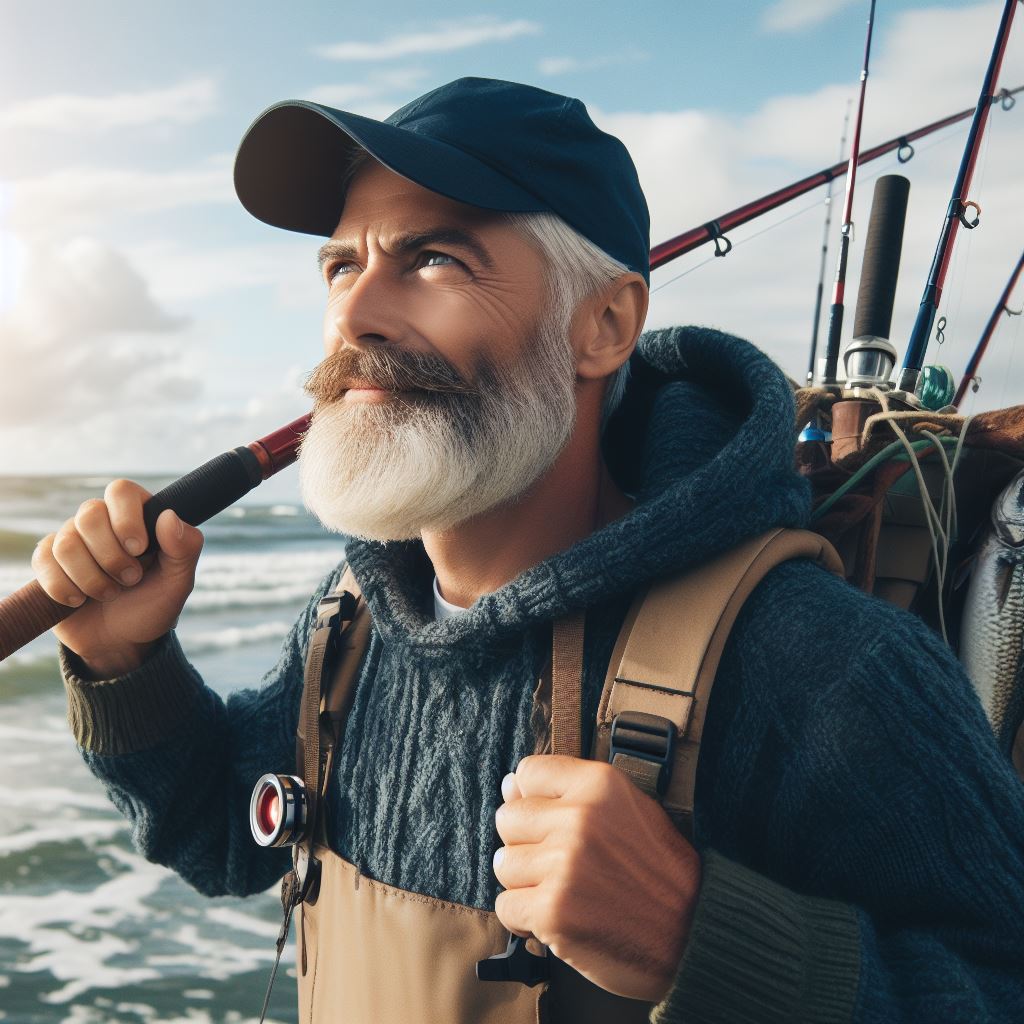Introduction
Navigating the vast expanse of UK waters, the significance of safeguarding fishermen’s health cannot be overstated.
This introduction delves into the critical importance of prioritizing the well-being of those braving the unpredictable seas.
The demanding nature of the fishing profession elevates the need for robust safety measures to the forefront.
As these dedicated individuals cast their nets and face the elements, the risks inherent in their work underscore the urgency of comprehensive health initiatives.
This section seeks to unravel the multifaceted challenges that fishermen encounter, emphasizing the industry’s responsibility in fostering an environment that values and protects the health and safety of its workforce.
Through heightened awareness and proactive measures, we aim to pave the way for a sea-faring community that thrives in both productivity and well-being.
Understanding the Risks
Hazardous Conditions Faced by Fishermen
- Adverse weather conditions pose a significant risk to fishermen’s safety while at sea.
- Rough seas, with high waves and strong currents, can make fishing operations extremely dangerous.
- Heavy machinery used in fishing, such as winches and cranes, can cause serious accidents if not handled properly.
Physical and Mental Challenges of the Job
- Fishermen often endure long working hours, sometimes being away from home and family for days or weeks.
- The physically demanding nature of the job, involving heavy lifting and strenuous activities, can lead to injuries.
- The isolation that comes with being at sea for extended periods can have a negative impact on mental health.
Statistics on Accidents and Injuries in the Fishing Industry
- According to official statistics, the fishing industry has one of the highest fatality rates among all occupations.
- In the UK, an average of 15 fishermen dies each year due to accidents at sea.
- Non-fatal injuries in the fishing sector are also common, with around 150 accidents reported annually.
- Many of these accidents result from falls overboard, vessel collisions, or being struck by moving machinery.
- Cold water immersion is a significant hazard, as it can lead to hypothermia, even during mild weather conditions.
In essence, being a fisherman in the UK entails facing numerous risks and challenges. Adverse weather conditions, rough seas, and heavy machinery all contribute to the hazardous nature of the job.
Additionally, long working hours and isolation can take a toll on a fisherman’s physical and mental well-being.
The statistics on accidents and injuries within the fishing industry highlight the importance of prioritizing safety at sea.
Safety Regulations and Guidelines
Maritime authorities in the UK have established strict safety regulations and guidelines to ensure the well-being of fishermen at sea.
Importance of Complying with Regulations
Complying with these regulations is of utmost importance to safeguard the lives and health of fishermen and prevent accidents and fatalities.
By adhering to the set guidelines, fishermen minimize the risks associated with their profession, creating a safer working environment.
Additionally, compliance promotes the overall welfare of the fishing industry, enhancing its reputation and sustainability.
Examples of Safety Measures
Personal Protective Equipment (PPE)
Fishermen are required to wear appropriate PPE to protect themselves from potential hazards.
These include waterproof clothing, life jackets, safety boots, gloves, and helmets.
Personalized UK Career Consulting
Receive tailored career guidance designed just for you. Get actionable steps and expert support to boost your career in 1-3 days. Take control of your career now.
Get StartedPPE acts as a barrier against the elements, sharp objects, and other dangers commonly found at sea.
Safety Drills
Frequent safety drills are conducted on fishing vessels to ensure that fishermen are prepared for emergencies.
These drills involve practicing response procedures to various scenarios, such as fires, man overboard situations, or vessel sinking.
By rehearsing these drills, fishermen become familiar with the necessary actions to minimize risks and maintain their safety.
Emergency Communication Systems
Every fishing vessel must be equipped with reliable communication systems to enable prompt communication in case of emergencies.
These systems include VHF radios, personal locator beacons, and distress signals.
Efficient communication ensures quick response times from rescue teams and increases the chances of survival during critical situations.
Safety Equipment Inspections
Fishing vessels undergo regular inspections to verify that safety equipment is well-maintained and in good working condition.
This includes checks on fire extinguishers, life rafts, flares, navigational aids, and other essential safety equipment.
Maintaining and inspecting safety equipment reduces the risk of malfunction during emergencies.
Weather Monitoring and Planning
Prior to setting sail, fishermen are advised to check weather forecasts and plan their trips accordingly.
A comprehensive understanding of the weather conditions helps fishermen determine safe fishing areas and avoid potential hazards.
Moreover, tracking weather changes during the trip allows them to make informed decisions and ensure their safety.
Proper Training and Certification
Fishermen undergo specialized training to acquire the necessary skills and knowledge to operate safely at sea.
Your Dream Job Starts with a Perfect CV
Get a tailored CV and cover letter that captures your unique strengths and stands out in your industry. Let us help you make an unforgettable first impression.
Get StartedThey are trained in areas such as navigation, first aid, firefighting, and survival techniques.
Certification verifies their competence and ensures a standard level of knowledge, reducing the likelihood of accidents.
In general, complying with safety regulations and guidelines set by maritime authorities in the UK is crucial for fishermen to safeguard their health and well-being at sea.
By implementing safety measures such as using personal protective equipment, conducting safety drills, and adhering to communication protocols, fishermen can mitigate risks and ensure a safer working environment.
Strict adherence to these regulations not only protects the lives of fishermen but also contributes to a sustainable and reputable fishing industry in the UK.
Health Concerns
Common health issues among fishermen
When it comes to the health of fishermen, there are several common issues that they face on a regular basis. These include musculoskeletal disorders, noise-induced hearing loss, and mental health problems.
Fishing is a physically demanding job that often requires repetitive movements and heavy lifting, putting a significant strain on the muscles and joints.
As a result, many fishermen suffer from musculoskeletal disorders such as back pain, tendonitis, and carpal tunnel syndrome.
Another health concern among fishermen is noise-induced hearing loss. The constant exposure to loud noise, such as engine noise and heavy machinery, can damage their hearing over time.
It is crucial for fishermen to wear appropriate hearing protection to prevent long-term damage.
Mental health problems are also prevalent among fishermen, largely due to the isolation and stress associated with the job.
Many fishermen spend long periods of time at sea, away from their families and support systems. This can lead to feelings of loneliness, depression, and anxiety.
The impact of irregular sleep patterns
In addition to these specific health issues, fishermen also face the impact of irregular sleep patterns, fatigue, and stress on their overall health.
Irregular sleep patterns are common in the fishing industry, as fishermen often work long hours and have irregular schedules.
Optimize Your LinkedIn for Success
Boost your LinkedIn profile with a professional bio, keyword-rich headline, and strategic recommendations that attract recruiters. Stand out from the crowd and get noticed.
Optimize NowThis lack of consistent sleep can lead to fatigue, which can impair judgment and increase the risk of accidents at sea.
Furthermore, the nature of the job can be highly stressful, with unpredictable weather conditions and the pressure to catch a sufficient number of fish.
The need for regular medical check-ups and preventive measures
To address these health concerns, regular medical check-ups are crucial for fishermen.
It is important for them to receive comprehensive examinations to detect any potential musculoskeletal issues, hearing loss, or signs of mental health problems early on.
Preventive measures should also be taken to ensure the overall well-being of fishermen. This includes promoting proper ergonomics and lifting techniques to minimize the risk of musculoskeletal disorders.
Additionally, providing education and training on the importance of hearing protection and mental health support is essential.
Overall, the health concerns faced by fishermen are diverse and require proactive measures to maintain their well-being.
By addressing musculoskeletal disorders, noise-induced hearing loss, mental health problems, irregular sleep patterns, fatigue, and stress, we can help fishermen stay safe and healthy at sea.
Read: Fishermen’s Training: How to Start in the UK
Safety Equipment and Technology
The importance of using proper safety equipment
Using proper safety equipment is crucial for fishermen to ensure their well-being and survival at sea. Life jackets, safety harnesses, and emergency beacons play significant roles in safeguarding their lives.
A life jacket serves as a vital tool that can keep a fisherman afloat in case of accidental falls or a capsize. It is essential to wear a well-fitting life jacket that suits the individual’s body type and ensures maximum protection.
Similarly, safety harnesses are instrumental in preventing fishermen from falling overboard during strong waves or unstable conditions on their vessels.
By securing themselves to the boat, they can minimize the risk of being swept away by the force of the sea.
Emergency beacons are another essential safety device that assists in locating fishermen in distress.
These devices emit signals that can be detected by search and rescue teams, leading to prompt and precise assistance, especially during emergencies.
The advancements in technology that enhance safety at sea
Advancements in technology have significantly contributed to enhancing safety measures for fishermen. The use of navigation and communication devices has revolutionized the way they operate at sea.
GPS systems have become an integral part of fishing vessels, aiding in accurate positioning and navigation.
Fishermen can rely on these devices to navigate through unfamiliar waters, avoiding potential hazards and reducing the risk of accidents.
Communication devices, such as radios and satellite phones, enable fishermen to stay connected with the shore and other vessels.
Effective communication ensures that they can seek help or report emergencies promptly, improving their chances of survival.
Training programs aimed at educating fishermen about the use of safety equipment and technology
Training programs are essential to educate fishermen about the proper use of safety equipment and technology.
These programs equip them with the knowledge and skills necessary to handle emergencies and mitigate risks effectively.
Dedicated courses on using life jackets and safety harnesses teach fishermen how to wear and maintain these devices correctly.
They also provide guidance on handling emergency beacons and utilizing different communication and navigation tools effectively.
Moreover, these training programs emphasize the importance of regular checks and maintenance of safety equipment.
A malfunctioning life jacket or a defective harness can prove to be fatal in critical situations, highlighting the need for periodic inspections and replacements.
By prioritizing safety equipment and technology, fishermen can significantly reduce the likelihood of accidents and improve their overall safety while at sea.
Remember, weather conditions and unpredictable circumstances pose constant risks to fishermen, making it crucial to equip them with the necessary tools and knowledge to ensure their well-being.
Read: Innovations in UK Farm Management Techniques

Mental Health and Well-being
Working as a fisherman demands resilience, impacting mental health. Isolation, physical challenges, and long hours affect overall well-being.
Mental health challenges like anxiety and depression are common due to the job’s nature, causing loneliness and overwhelming conditions.
Recognize mental health support’s significance. Provide resources to improve overall well-being, helping cope with unique challenges.
Access to counseling services is vital. They offer a safe space for discussing emotions, fears, and anxieties with professionals.
Initiatives in the UK focus on fishermen’s mental health, raising awareness, offering counseling, and creating support networks.
The Fishermen’s Mission supports families, offering mental health assistance, emergency support, and financial advice.
The Fishing Community Network promotes well-being, providing resources, workshops, and counseling services for effective mental health management.
Mind, a UK mental health charity, extends support to fishermen through counseling, helplines, and online resources.
Encourage physical well-being for positive mental health. Regular exercise, a healthy diet, and sufficient rest contribute to overall resilience.
Promote open communication in the fishing community. Encourage colleagues to discuss mental health comfortably and provide awareness training.
Reduce mental health stigma. The industry, through understanding and empathy, can create a judgment-free space that encourages seeking help.
Prioritize fishermen’s mental health. The industry’s commitment can enhance overall quality of life for dedicated individuals.
Read: Challenges Facing Today’s UK Farm Managers
Gain More Insights: Essential Skills for UK Agri-Managers in 2024
Importance of Training and Education
Proper training and education are crucial for fishermen to enhance their safety knowledge and skills.
Significance of Training and Education
Understanding the importance of training and education is vital for fishermen’s safety at sea. It equips them with the necessary knowledge and skills to handle emergencies and stay safe in challenging conditions.
Various Training Programs and Courses
The UK offers a range of training programs and courses specifically designed for fishermen.
These programs aim to provide comprehensive training on various aspects of fishing safety, including:
- Basic First Aid
- Survival Techniques
- Emergency Preparedness
- Navigation and Seamanship
- Firefighting and Fire Prevention
- Man, Overboard Recovery
- Personal Protective Equipment (PPE) Usage
These courses are conducted by experienced trainers who have extensive knowledge of the fishing industry and its unique challenges.
Continuous Education and Safety Procedures
It is essential for fishermen to stay updated about safety procedures and regulations through continuous education. This includes attending workshops, seminars, and conferences related to fishing safety.
Continuing education ensures that fishermen are aware of new safety practices and technologies that can enhance their safety and well-being at sea.
Benefits of Training and Education
Proper training and education offer several benefits to fishermen:
- Improves Safety Awareness: Training programs increase fishermen’s awareness of potential risks at sea and how to mitigate them.
- Enhances Emergency Response: Education equips fishermen with the skills to respond effectively to emergencies, reducing the likelihood of accidents or injuries.
- Promotes Teamwork: Training programs often focus on teamwork and communication, fostering a collaborative environment among fishermen, which is crucial for their safety.
- Reduced Insurance Costs: Well-trained fishermen are less likely to experience accidents or injuries, leading to potential reductions in insurance premiums.
- Professional Development: Training and education contribute to the professional growth of fishermen, improving their career prospects in the long run.
In essence, proper training and education are of utmost importance for fishermen’s safety at sea.
These programs equip them with essential knowledge and skills while keeping them updated about safety procedures and regulations.
Investing in training and education not only enhances fishermen’s safety but also benefits their overall professional development and well-being.
Read: A Day in the Life of a UK Forester
Explore Further: The Role of AI in UK Farm Management
Conclusion
This blog post highlighted the importance of prioritizing fishermen’s health and safety at sea in the UK.
The key points discussed include the hazardous nature of the fishing industry, the risks faced by fishermen, and the initiatives taken to promote their well-being.
It is crucial to recognize and address the unique challenges faced by fishermen, such as long hours, physical strain, and unpredictable weather conditions.
By prioritizing their health and safety, we not only protect their well-being but also support the sustainability of the fishing industry.
To ensure fishermen’s safety, it is essential to implement robust safety protocols, provide proper training and equipment, and foster a culture of awareness and caution.
Additionally, social support systems and mental health resources should be readily available to address the psychological impact of this demanding profession.
Awareness plays a significant role in promoting fishermen’s well-being and safety.
As readers of this blog, we encourage you to spread awareness about the challenges faced by fishermen and the importance of their health and safety.
Share this knowledge with others and support initiatives that strive to improve the well-being of fishermen in the UK.
Let us remember that fishermen’s health and safety at sea should be a top priority for individuals, organizations, and policymakers alike.
By working together, we can ensure a safer and healthier future for the dedicated individuals who provide us with the bounty of the sea.
[E-Book for Sale]
500 Cutting-Edge Tech Startup Ideas for 2024 & 2025: Innovate, Create, Dominate
$19.99 • 500 Tech Startup Ideas • 62 pages
You will get inspired with 500 innovative tech startup ideas for 2024 and 2025, complete with concise descriptions to help you kickstart your entrepreneurial journey in AI, Blockchain, IoT, Fintech, and AR/VR.




